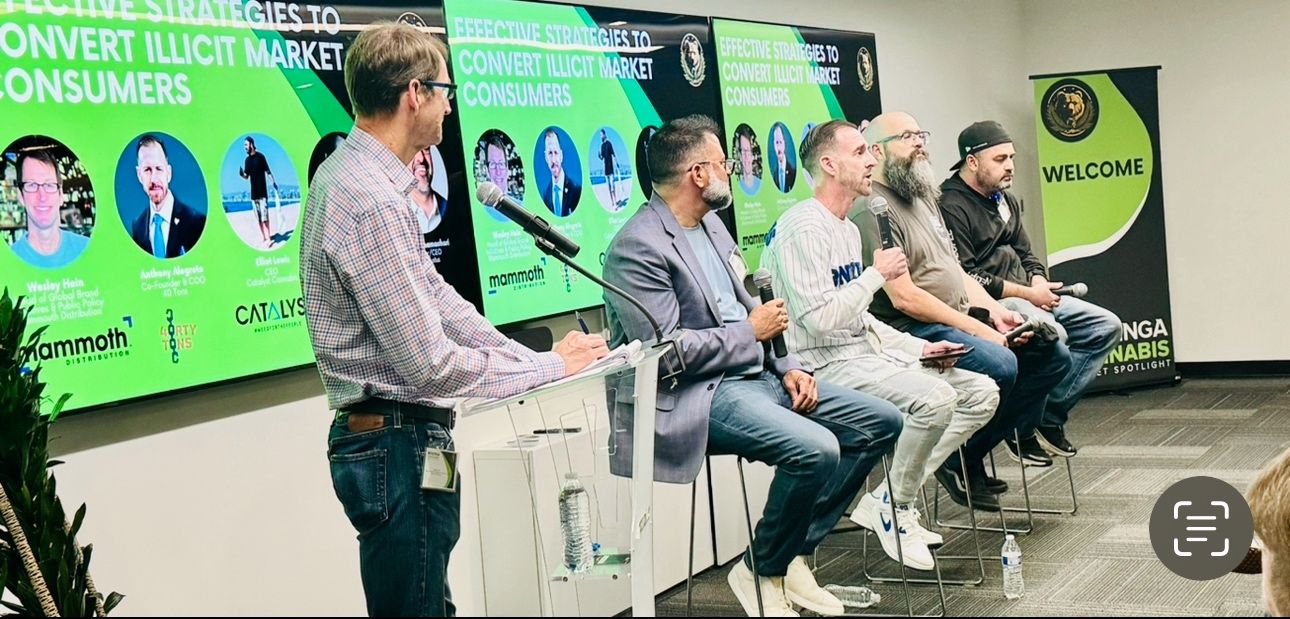REVIEW: Green Dreams and Growing Pains: Benzinga’s L.A. Event Sheds Light on the Future of California’s Cannabis Industry
LOS ANGELES- At the Benzinga Market Spotlight event in the Bioscience LA venue, discussions unfolded that highlighted the diverse strategies and viewpoints within California’s cannabis industry.
One of the key speakers at Benzinga LA was Kyle Kazan, co-founder and CEO of Glass House Brands Inc., Kyle offered a comprehensive overview of the challenges and opportunities facing the largest cannabis cultivator on the planet.
Kazan, a former LAPD officer heads up the largest cultivator in the world at Glass House. Often lambasted for being a former cop, Glass House are treated with skepticism by the community for that reason and for their determination to be the lowest cost producer regardless of how many small farmers they put out of business.
Above left: Kyle Kazan, CEO of Glass House Brands Inc, speaks to Rachel Wright of 420 CPA, managing partner of 420CPA ABFinWright, LLP, and a host at Highly Capitalized.
Kyle underscored the need for significant regulatory reform, specifically advocating for the descheduling of cannabis from its current Schedule I classification, removing it entirely from the Controlled Substances Act (1972).
His stance, well received by otherwise skeptical attendees, emphasized the necessity of incentivizing the illicit market to transition into the legal framework through initiatives like a multi-year tax moratorium, aiming to reshape and integrate the market for the benefit of all stakeholders.
Following Kazan’s forward-looking perspective, later that day Elliot Lewis, CEO of Catalyst Cannabis Co., provided his take on the current state of cannabis cultivation in California.
Lewis, known for his successful expansion of Catalyst Cannabis Co. and a notable victory against the in a lawsuit that promises future tax reductions for certain cannabis products, highlighted the crucial need for investor diligence.

Seated: from L-to-R: Wesley Hain, Mammoth; Antony Alegrete, 40 Tons, Bill Levers, Beard Bros Pharms and Elliot Lewis, CEO Catalyst Cannabis Co.
By questioning the sustainability and transparency of ‘megagrows,’ Lewis suggested that insufficient scrutiny could inadvertently bolster the illicit market, indicating that some production might be slipping into illegal channels.
His candid critique, particularly of operations like Glass House Brands Inc., sparked a broader conversation about market dynamics, competition, and the survival of smaller, craft-oriented cannabis farmers in the face of industrial-scale cultivation.
Benzinga was a good update on the market. It was well attended by about 200 people.
Above all it was a who’s who of the modern industry. The discussions revealed a consensus on several key issues: the transformative potential of interstate commerce, the lessons learned from past industry missteps, notably those associated with MedMen, and the collective move towards a more sustainable and integrated market model.
The Benzinga Cannabis Capital Conference not only showcased the vibrancy and resilience of the industry amid challenging times but also highlighted the diverse approaches to navigating its future.
Kazan’s advocacy for regulatory reform and Lewis’s call for greater transparency and responsibility in cultivation practices reflect the industry’s broader quest for legitimacy, sustainability, and growth.
The insights from the retail profitability panel further underscored the industry’s potential pivot points, from embracing interstate commerce to recognizing the foundational role of those who have weathered its tumultuous early years.
Certainly, the event was a success, despite Elliot and others labeling it ”Chadzinga.” Indeed, the organizers took pains to be relevant to the local market, even sporting 40 Tons/Benzinga baseball tops. Organizer Patrick Lane was pleased: “It was our first event in California and we loved it. More to come in the future.” Indeed, many people welcomed the short one day event as 3 day events are hard to factor in to business cannabis executive’s schedules. Net, Benzinga plan more market spotlights in the future following the relative success of this event.
As the California cannabis industry continues to evolve, the collective wisdom and experiences shared at Benzinga’s event point towards a future where both large-scale cultivators and craft cannabis producers might find common ground in a legally and commercially integrated landscape.





































